
It's possible to make good bread with only yeast, flour, salt and water; many of the best artisanal breads contain only those four ingredients. So if you're new to bread baking, you might discover recipes with a lengthy list of ingredients and wonder why you're putting them into your bread. Some ingredients simply alter the flavor of your loaf, but most play more important roles. For example, eggs and oil directly affect bread texture.
How It All Works
Before you can properly understand the effect added ingredients have on your bread, it's important to know how yeast breads work. Bread gets its structure and texture from gluten, long and stretchy strands of protein created when the flour is moistened and worked into dough. As the yeasts in your dough go about their business, they leave behind tiny amounts of carbon dioxide as waste. The rubbery strands of gluten trap those gas bubbles, which then blow up like tiny balloons as the carbon dioxide expands in the oven's heat. The flour's proteins become firm as your bread bakes, just as an egg solidifies in your frying pan, and give the loaf its final shape.
Oil in Your Dough
A few kinds of bread rely on highly flavored oils, such as virgin olive oil, for their flavor. Aside from those, oil is usually added to bread to make it softer. You might enjoy the tough, chewy crust of an artisanal loaf occasionally, but sometimes a softer result is more versatile. Oil serves that purpose. It lubricates the flour's proteins, shortening the strands of gluten and weakening the bonds that hold them together. That makes the bread softer and easier to chew. Vegetable oil shortening serves the same purpose, which is how it acquired its name.
Eggs and Structure
Eggs have a more complicated effect on bread, because they're a more complicated ingredient. They consist largely of water, so they add to the bread's liquids and provide some of the moisture that helps gluten develop. The yolks also contain a high percentage of fat, which like oil lubricates the proteins and weakens gluten development. However, eggs also contain large quantities of protein. Those proteins set and become firm when the bread bakes, helping contribute to its crumb structure. Egg proteins are softer and less chewy than gluten proteins, so the end result is a loaf with a tenderer texture.
Further With Eggs
Those attributes alone would make eggs a noteworthy bread ingredient, but they have a handful of other useful effects as well. They add richness and flavor to the bread, so sweet breads and festive breads almost always include eggs. They also contain powerful emulsifiers that help bring fat-based ingredients and water-based ingredients together into a smooth, pliant dough. That's especially important in butter-rich sweet or holiday breads, a second reason those loaves almost invariably include eggs. Eggs also give the loaf a rich golden color inside and out, and many bakers brush beaten egg over the loaves before baking to intensify the effect.
Related Articles

Whole Eggs Vs. Egg Yolks for Sweet Bread

How to Make Bread Tender

How Many Calories in Gluten-Free Bread?

Main Ingredients of English Muffins

Does Yeast Cause Holes in Bread?

What Can I Use as an Egg Substitute ...
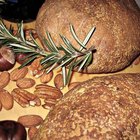
What Is Artisan Bread?

What Is a Stabilizer in Baking?
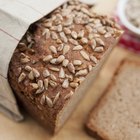
Russian Rye Bread vs. Pumpernickel

How to Add Gluten to All-Purpose Flour

How to Make Bread Chewy

How to Egg Wash a Loaf of Challah Bread
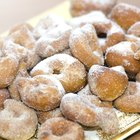
What Is the Difference Between a Bagel ...
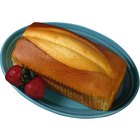
Why Use an Egg Wash Topping Before ...
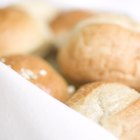
How to Make Yeast Rolls More Flavorful
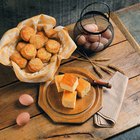
What Can I Use as an Egg Substitute ...

I Forgot to Put the Egg in the Banana ...

Does Adding an Extra Egg to Brownie Mix ...

What Kind of Bread Do I Serve With ...

What to Do With Pizza Dough When You're ...
References
- On Food and Cooking: The Science and Lore of the Kitchen; Harold McGee
- King Arthur Flour: Bread Machines & Ingredients
Writer Bio
Fred Decker is a trained chef and prolific freelance writer. In previous careers, he sold insurance and mutual funds, and was a longtime retailer. He was educated at Memorial University of Newfoundland and the Northern Alberta Institute of Technology. His articles have appeared on numerous home and garden sites including GoneOutdoors, TheNest and eHow.
Photo Credits
Hemera Technologies/AbleStock.com/Getty Images